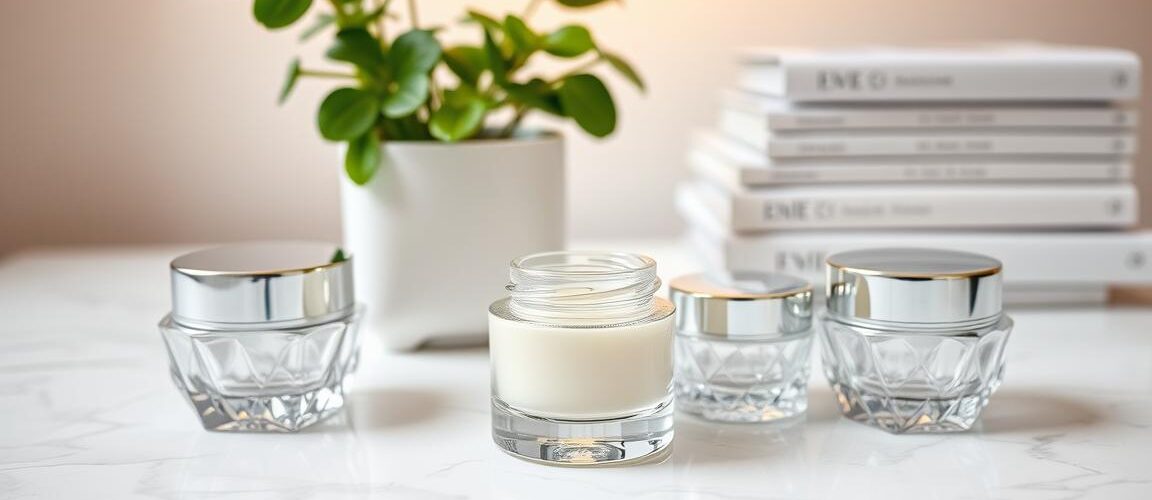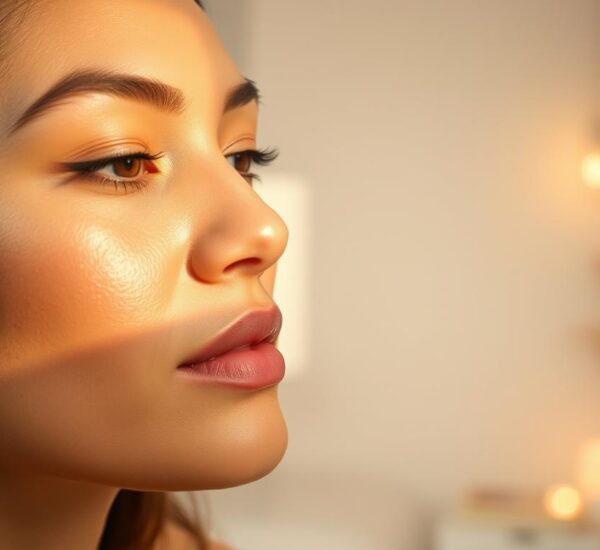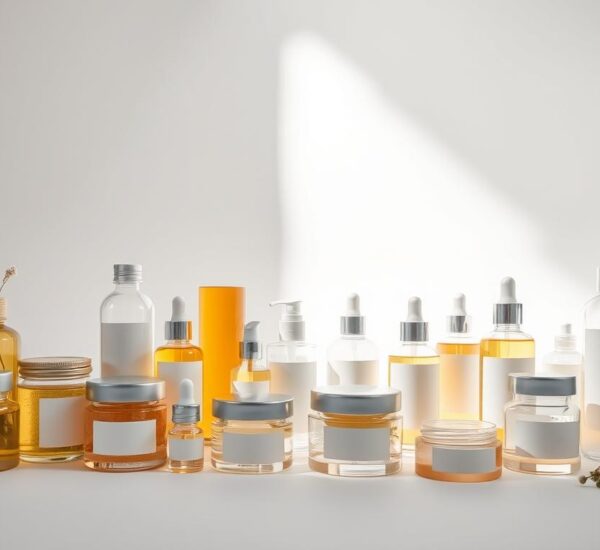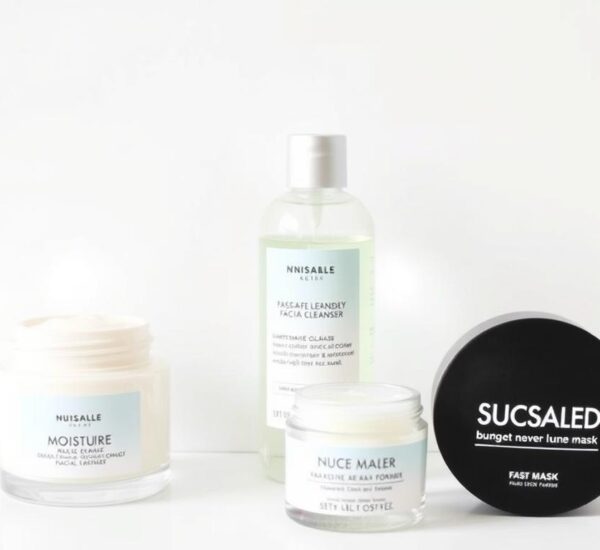As we age, our skin changes a lot. We start to see wrinkles, fine lines, and age spots. But, with the right anti-aging skincare routine, we can fight these signs and look younger.
Experts say a simple skincare routine can greatly improve our skin’s health and look. By using the best anti-aging products every day, we can make our skin smoother and more radiant.
We will look at the best tips for skincare for aging skin. You’ll get great advice to make your skin look fresh and young again.
Key Takeaways
- Understand the importance of a simple skincare routine in reducing signs of aging.
- Learn how to choose the best products for your skin type.
- Discover the top anti-aging skincare tips for a smoother complexion.
- Find out how to incorporate anti-aging products into your daily routine.
- Revitalize your skin with effective skincare practices.
Understanding the Aging Process
It’s important to know how our skin ages to find the best ways to keep it looking young. As we get older, our skin changes a lot. These changes affect how it looks and feels.
What Happens to Our Skin as We Age?
Our skin makes less collagen and elastin as we age. This makes wrinkles and fine lines appear. Collagen and elastin are key for keeping our skin elastic and firm.
Our skin also gets drier and more easily irritated with age. It can’t regenerate itself as well, making it look dull and uneven.
Key Factors in Skin Aging
Many things can make our skin age faster. Sun exposure, smoking, and a bad diet are big ones. UV rays from the sun harm skin cells, speeding up aging. Smoking hurts skin elasticity, and a bad diet can harm skin health.
- UV exposure from the sun or tanning beds
- Smoking and other lifestyle habits
- Poor dietary choices and hydration
- Genetic predisposition
Common Myths About Aging Skin
There are many myths about aging skin. Some think anti-wrinkle creams can completely stop aging. But, while they help, a full approach is better.
Another myth is that sunscreen is only for sunny days. But, you should wear sunscreen every day, even on cloudy days, because UV rays can get through clouds.
Must-Have Ingredients in Anti-Aging Skincare
Choosing the right ingredients is key for anti-aging skincare. Products with proven ingredients help your skin look younger and smoother.
Let’s look at the top ingredients for your anti-aging skincare routine.
Retinol: The Gold Standard
Retinol is a top anti-aging ingredient. It reduces wrinkles and fine lines, making it a must-have. It boosts cell turnover, unclogging pores and improving skin texture.
Hyaluronic Acid: Hydration Hero
Hyaluronic acid is vital for anti-aging skincare. It holds moisture, making skin look plumper and hydrated. It’s great for dryness and fine lines.
Antioxidants: Fighting Free Radicals
Antioxidants protect the skin from environmental damage. They fight free radicals, reducing aging signs. Vitamins C and E are common antioxidants in skincare.
Peptides: Building Blocks of Skin
Peptides are amino acids that build skin proteins like collagen and elastin. They boost collagen, improving skin elasticity and reducing wrinkles.
Adding products with these ingredients to your anti-aging skincare routine can greatly improve your skin’s health and appearance.
The Importance of Sunscreen
Sunscreen is key in anti-aging skincare. It prevents skin damage and reduces aging signs.
How UV Rays Accelerate Aging
UV rays from the sun or tanning beds harm our skin. UVA rays go deep into the skin, causing aging and wrinkles. UVB rays cause sunburn, which also ages the skin. Long-term UV exposure breaks down collagen and elastin, keeping our skin firm and elastic.
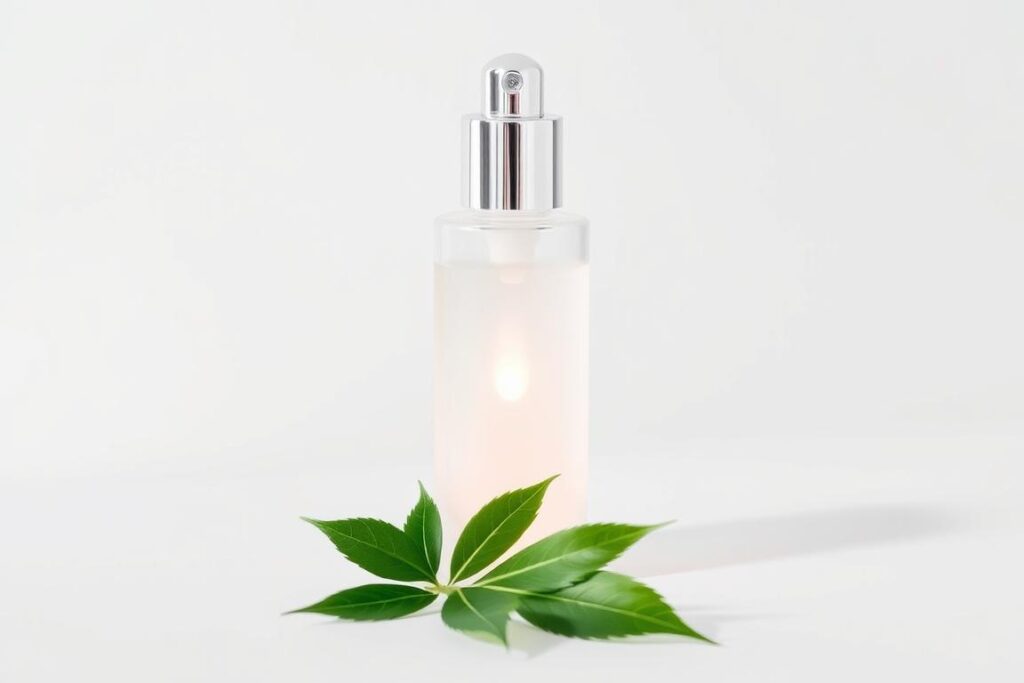
Best Sunscreens for Anti-Aging
Not all sunscreens are the same for anti-aging. Look for broad-spectrum protection with an SPF of at least 30. Some also have antioxidants to protect against environmental stressors.
| Sunscreen Type | SPF | Additional Benefits |
|---|---|---|
| Physical Sunscreen | SPF 30 | Contains zinc oxide for broad-spectrum protection |
| Chemical Sunscreen | SPF 50 | Includes antioxidants like vitamin E |
| Hybrid Sunscreen | SPF 40 | Combines physical and chemical active ingredients |
Daily Sunscreen Application Tips
To use sunscreen right, apply it generously. Apply 15-30 minutes before going outside. Reapply every two hours or after swimming or sweating. Remember to cover often-missed spots like the tops of your ears and the back of your neck.
- Choose a sunscreen that is labeled “non-comedogenic” or “oil-free” to avoid clogging pores.
- Apply sunscreen as the last step in your morning skincare routine, before makeup.
- Use a lip balm with SPF to protect your lips from UV damage.
Developing a Consistent Skincare Routine
Consistency is key in skincare, more so for those fighting aging signs. A regular skincare routine can greatly improve your skin’s look.
It’s important to know the difference between morning and evening skincare. Morning skincare protects your skin from the environment and UV rays. Evening skincare repairs your skin while you sleep, using products that rejuvenate.
Morning vs. Evening Skincare
Your morning routine should start with a gentle cleanser. Then, use a toner to balance your skin’s pH. Finish with a moisturizer with SPF to protect against UV rays. In the evening, use more intense treatments like anti-wrinkle creams or serums with retinol for skin regeneration.
Steps for an Effective Anti-Aging Regimen
For an effective anti-aging skincare routine, follow these steps:
- Cleanse your skin gently but thoroughly.
- Apply a toner to help balance your skin’s pH.
- Use a serum or treatment product containing anti-aging ingredients like retinol or peptides.
- Moisturize to hydrate your skin and lock in previous products.
- Apply sunscreen during the day to prevent further aging caused by UV exposure.
When to Introduce New Products
When adding new products, do it slowly. Start with one new product at a time. Watch how your skin reacts before adding more. This prevents irritation and helps you find out which products work best for you.
By sticking to these tips and keeping a consistent skincare routine, you can fight aging signs. You’ll get healthier, more youthful-looking skin.
The Role of Diet in Skin Health
Eating the right foods is key to fighting aging. A diet full of nutrients can help keep your skin looking young. We’ll look at foods that keep skin looking fresh, the need for staying hydrated, and the benefits of supplements.
Foods that Support Youthful Skin
Fruits, vegetables, and omega-3s are great for your skin. Antioxidant-rich foods like berries and leafy greens fight off skin damage.
- Berries: Full of antioxidants, berries protect your skin from harm.
- Leafy Greens: Packed with vitamins and minerals, they boost skin health.
- Fatty Fish: Omega-3s in fish like salmon reduce inflammation.
- Nuts and Seeds: Rich in antioxidants and healthy fats.
Hydration and its Impact on Aging
Drinking enough water is vital for skin health. It keeps your skin hydrated from the inside.
- Drink at least eight glasses of water a day.
- Eat hydrating foods like cucumbers and watermelon.
- Limit caffeine and alcohol to avoid dehydration.
Supplements for Healthier Skin
Even with a good diet, supplements can help. Some supplements support skin health.
- Omega-3 Supplements: For those who don’t eat enough fatty fish.
- Vitamin C Supplements: Boost collagen production.
- Probiotics: Good for gut health, which affects skin health.
Lifestyle Changes for Improving Skin Appearance
Getting a glowing complexion is more than just about skincare products. It’s about making lifestyle changes too. Our daily habits play a big role in how our skin looks and feels.
Sleep and Skin Regeneration
Sleep is key for healthy, young-looking skin. While we sleep, our body fixes damaged skin cells and builds muscle. It also boosts our immune system.
Not getting enough sleep can make us stressed. Stress can cause inflammation and harm our skin.
Good sleep helps reduce wrinkles and improve skin texture. To sleep better, keep a regular schedule and make your bedroom comfy.
Exercise: A Key to Healthy Skin
Exercise is great for our health and skin. It boosts blood flow, which feeds our skin cells. It also lowers stress, which can cause acne.
For example, morning yoga can make our skin glow.
Managing Stress for Better Skin
Stress can harm our skin, causing acne and premature aging. Stress-reducing activities like meditation or yoga can help. They make our skin healthier and more resilient.
| Lifestyle Change | Benefit to Skin |
|---|---|
| Adequate Sleep | Improves skin regeneration, reduces fine lines and wrinkles |
| Regular Exercise | Enhances blood circulation, reduces stress |
| Stress Management | Reduces skin issues like acne and rosacea, promotes healthier skin |
By making these lifestyle changes, we can greatly improve our skin. It’s about a complete skincare approach. This includes the right products and a healthy lifestyle.

Targeting Specific Skin Concerns
As we age, our skin changes in many ways. This can lead to fine lines, wrinkles, sagging skin, and uneven skin tone. Effective anti-aging skincare tackles these issues with special treatments and products.
Fine lines and wrinkles are common concerns. They can be caused by aging, sun exposure, and lifestyle choices. To combat them, we can use products with retinol, peptides, or hyaluronic acid. These ingredients help to plump and smooth the skin.
Treating Fine Lines and Wrinkles
For fine lines and wrinkles, it’s key to use products with proven ingredients. Retinol, for example, boosts collagen and cell turnover. This reduces the look of fine lines and wrinkles.
- Use a serum or cream with retinol at night.
- Apply a product with hyaluronic acid to keep the skin hydrated.
- Try a peptide-based product to boost collagen.
Solutions for Sagging Skin
Sagging skin is another common issue. It can be tackled with anti-aging skincare. Products with hyaluronic acid and antioxidants help firm and lift the skin.
Professional treatments like microneedling or laser treatments can also help. They stimulate collagen and improve skin elasticity.
Addressing Uneven Skin Tone
Uneven skin tone can be due to hyperpigmentation and aging. To fix this, we can use products with vitamin C or niacinamide. These ingredients help brighten and even out skin tone.
It’s also important to use a sunscreen with a high SPF every day. This prevents further damage and hyperpigmentation.
By understanding and addressing our specific skin concerns, we can create an effective anti-aging skincare routine. This routine will include the best anti-aging products for our needs.
Professional Treatments to Consider
To boost your anti-aging efforts, think about adding professional treatments to your routine. Options like chemical peels, microneedling, and laser treatments can greatly improve your skincare.
Chemical Peels: What to Expect
Chemical peels are a favorite for fighting aging. They apply a solution to peel off the skin’s top layers, revealing smoother, brighter skin. This can help lessen fine lines, wrinkles, and skin discoloration.
During a chemical peel, your skin is first cleaned well. Then, a chemical solution is applied, causing a tingling or burning feeling. After a set time, the solution is neutralized or washed off.
Benefits: Your skin will feel smoother, look brighter, and have a more even tone.
Risks: You might experience redness, irritation, or scarring if not done right.
Microneedling: Benefits and Risks
Microneedling is a gentle treatment that uses tiny needles to make micro-injuries in the skin. This stimulates collagen production and rejuvenates the skin.
Benefits include: Your skin will feel tighter, look smoother, and have better texture.
But, microneedling can also cause redness, infection, or scarring if not done correctly.
Laser Treatments for Anti-Aging
Laser treatments use high-energy light to target aging concerns like wrinkles and age spots. They stimulate collagen, improve texture, and reduce wrinkles.
Types of Laser Treatments:
- Ablative lasers: Remove the top skin layers, promoting new collagen growth.
- Non-ablative lasers: Stimulate collagen without removing the top skin layers.
Here’s a comparison of the discussed professional treatments:
| Treatment | Benefits | Risks | Downtime |
|---|---|---|---|
| Chemical Peels | Improved skin texture, reduced fine lines | Redness, irritation, scarring | Several days to a week |
| Microneedling | Improved skin elasticity, reduced wrinkles | Redness, infection, scarring | A few days |
| Laser Treatments | Improved skin texture, reduced age spots | Redness, infection, changes in skin pigmentation | Several days to several weeks |
Knowing the benefits and risks of these treatments helps you choose the best one for you.
The Future of Anti-Aging Skincare
The anti-aging skincare world is on the verge of a big change. New technologies and trends are coming up. They promise to make best anti-aging products even better. As we learn more about skin aging, new solutions are being made to tackle different skin issues.
New Technologies in Skincare
New tech is changing anti-aging skincare. Things like nanotechnology and biotechnology are being used. They help make treatments more precise and powerful.
Trends Shaping the Industry
Several trends are shaping the anti-aging skincare market. People want products that are good for the planet and their skin. There’s also a move towards skincare that’s made just for you.
Eco-Friendly Skincare Practices
Being green is key in skincare now. Brands are using eco-friendly packaging and getting ingredients in a responsible way. They’re also working to cut down on waste.
## FAQ
### Q: What are the most effective anti-aging skincare ingredients?
A: Look for products with retinol, hyaluronic acid, antioxidants, and peptides. These ingredients help reduce aging signs and make your skin look younger.
### Q: How often should I apply sunscreen for anti-aging?
A: Apply sunscreen every day, even on cloudy days. Use a broad-spectrum sunscreen with SPF 30. Reapply every two hours or after swimming or sweating.
### Q: What is the best anti-aging skincare routine?
A: Start with a morning and evening skincare routine. Cleanse, tone, and apply anti-aging products. Moisturize and protect with sunscreen.
### Q: Can diet affect the aging process of my skin?
A: Yes, eating well can help your skin stay young. Include fruits, vegetables, and whole grains in your diet. Antioxidant-rich foods like berries and leafy greens fight aging.
### Q: Are professional treatments like chemical peels and laser treatments effective for anti-aging?
A: Professional treatments can greatly reduce aging signs. Chemical peels, microneedling, and lasers improve texture and reduce wrinkles. Always consult a dermatologist to find the right treatment for you.
### Q: What lifestyle changes can I make to improve my skin’s appearance?
A: Get enough sleep, exercise, and manage stress for healthier skin. Sleep helps skin regeneration, while exercise boosts collagen. Stress management like meditation can also help.
### Q: How can I choose the best anti-aging products for my skin type?
A: Consider your skin type and concerns when picking products. For acne-prone skin, choose non-comedogenic products. For dry skin, opt for moisturizing products. Always check the ingredients for your specific needs.
### Q: What are some trends to watch in anti-aging skincare?
A: Sustainable skincare is becoming popular, with eco-friendly packaging and ingredients. New technologies like AI and nanotechnology are also being used to create better products.
